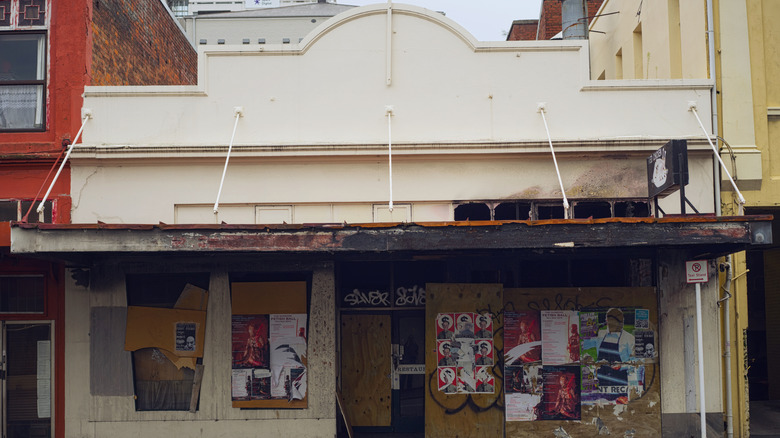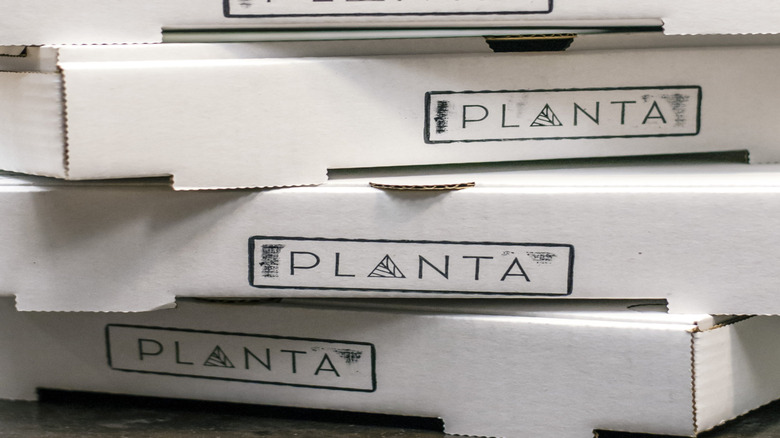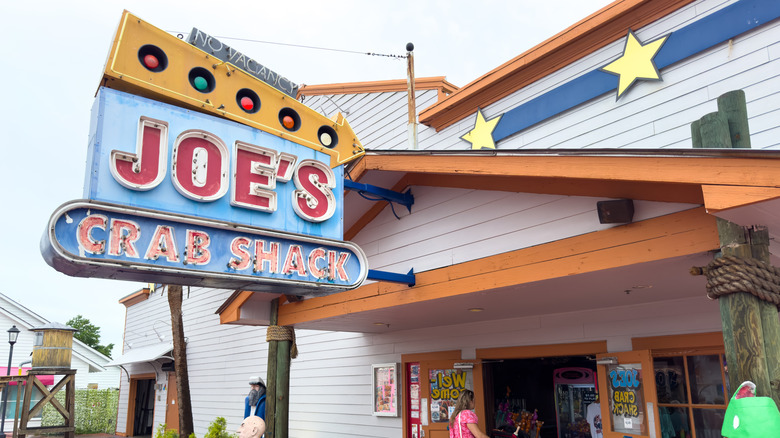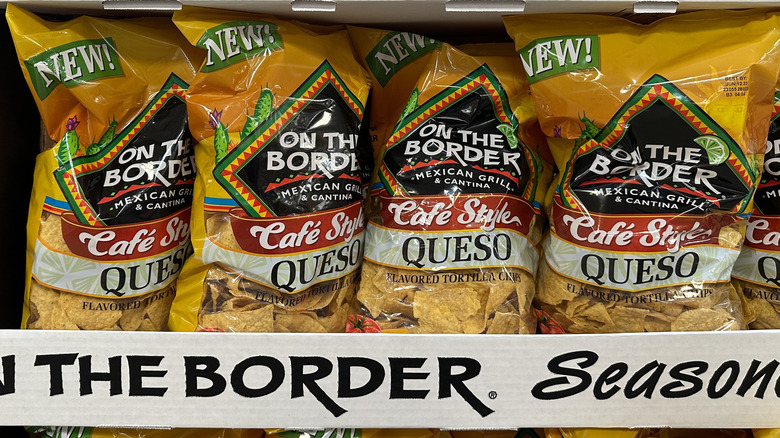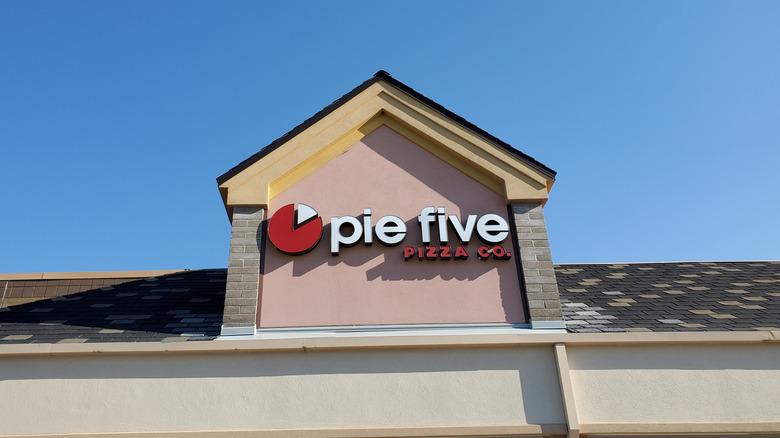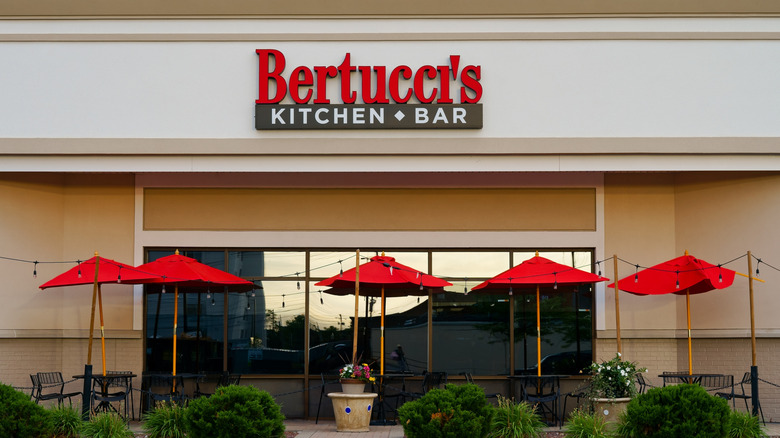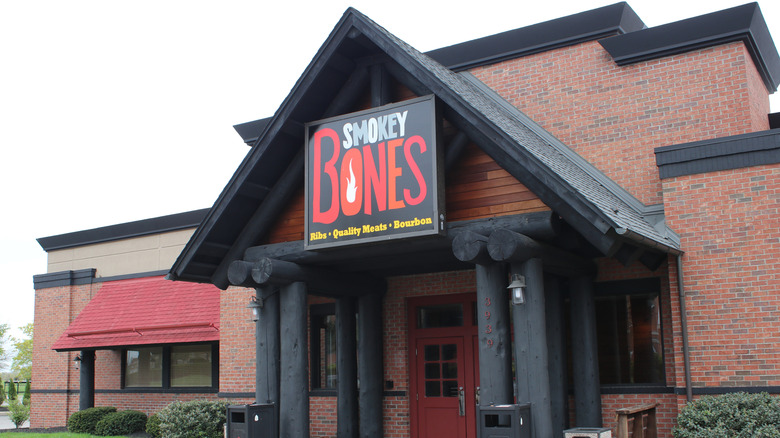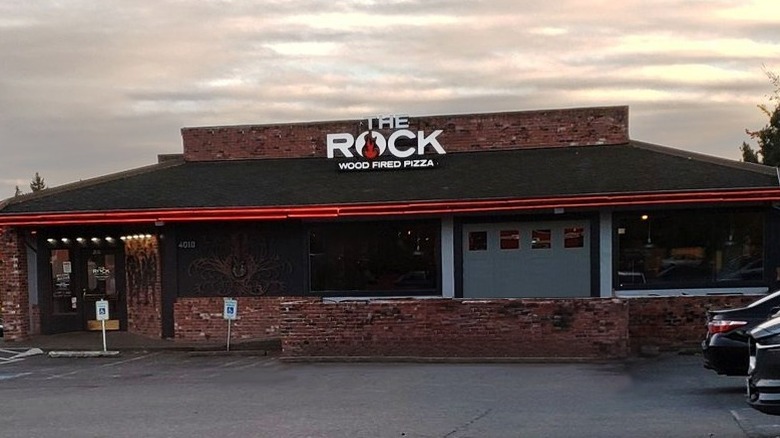Beloved Chain Restaurants We Might Sadly Lose In 2026
No investor looking for a sure bet gets into the restaurant business. The average lifespan of a restaurant is just 4.5 years — less time than kindergarteners have been alive. But the allure of becoming a neighborhood's favorite watering hole can be too much to pass up, let alone the dream of building a beloved chain of restaurants that people choose for dinners out.
Unfortunately, 2025 wasn't any kinder to the restaurant business than other years since the pandemic, with food costs continuing to rise and employment woes rampant. Restaurants are forced to raise prices to keep profits coming in, but those menu increases are making more diners consider another meal at home instead of in a restaurant booth. The cost of eating out has risen by about a third from April 2020 until now, according to the Bureau of Labor Statistics data.
Some chain restaurants are booming, and you're likely to see them everywhere in 2026 and beyond. Others, however, are at risk of falling off the map altogether. Several burger chains closed numerous locations in 2025, and there are signs that Wendy's in particular is struggling. Others are in even more dire straits and might join the growing list of restaurants that have completely disappeared. Here are a few you might want to visit before they go the way of the dodo bird ... or perhaps more accurately, the way of Chi-Chi's.
Bar Louie
This chain of gastrobars, known for its array of martinis and pub fare, was one of many restaurant concepts that struggled in the wake of the pandemic. In 2018, the Texas-based chain had grown to more than 130 locations across the United States, but by 2020, the company filed for Chapter 11 bankruptcy, which allows a business to continue operating while restructuring itself, in an effort to become profitable again.
Unfortunately, those efforts haven't paid off as planned. Bar Louie has continued to close locations in the years since, and in March 2025, filed for Chapter 11 bankruptcy again. By then, the business was down to just 48 locations (a mix between corporate-owned and franchises), which dwindled further to just 39 locations in October of the same year. The most current bankruptcy filing paints a bleak picture. Bar Louie claims to have between $1 million and $10 million in assets, but its debts are estimated between $50 million and $100 million. That math doesn't math — at least not in a profitable way.
The remaining Bar Louie locations were bought in October 2025 by a company that also owns and operates restaurant locations for Applebee's, Burger King, Papa John's, and more. It remains to be seen if new ownership will jump-start a revival for the chain or be the final nail in the coffin in 2026.
Planta
This uber-trendy chain of vegan restaurants aimed to appeal to, yes, vegans. But only around 5% of Americans say they are vegetarian or vegan, according to a Gallup poll in 2023. That means in order to stay profitable, Planta also needs to bring in a fair amount of omnivores who are interested in a plant-based diet — at least for a dinner out.
While the chain's Instagram page is aesthetically pleasing and the dining atmosphere is modern and bright, the business struggled to draw enough customers to stay in the black. In May 2025, Planta filed for Chapter 11 bankruptcy and closed multiple locations. The chain was up to 18 spots across the country before it filed for bankruptcy, but now has just seven locations left, according to its website. Unsurprisingly, most of those are in large urban centers, including two locations in Toronto (where the chain was founded), and spots in Los Angeles and New York.
According to the bankruptcy paperwork, Planta cited increased labor and food costs in recent years, with rising menu prices that ended up affecting the number of customers. Company leadership also reported that rent payments to commercial landlords and fees from third-party delivery apps hurt its bottom line. The remaining locations were bought in September, and time will tell if the updated structure will be enough to sustain the chain or sink it for good.
Joe's Crab Shack
There's a major problem with running a seafood restaurant: Seafood is expensive to purchase, and people can eat a lot of it. When was the last time you filled up on just five shrimp, for example? Joe's Crab Shack and Red Lobster both have fast-casual restaurant vibes that call for "affordable" seafood on the menu, and yet it can be extremely difficult to turn a profit when people expect large portions for a cheap price.
While the once-struggling Red Lobster is making a comeback, Joe's Crab Shack has yet to do the same. At one point, Joe's had more than 150 locations to its name across the country. Now, it's been closing locations at a fast clip, with just 18 remaining in October 2025. By last count the following month, only 15 locations remain.
Interestingly enough, 36% of millennials perceive seafood to be more affordable than other proteins like beef, chicken, and pork, so Joe's problem isn't necessarily that customers won't spend money on menu items like crab or shrimp. However, that same age group often purchases seafood for reasons like health, freshness, and sustainability. If Joe's can't capitalize on those sentiments, 2026 might become its swan song.
Iron Hill Brewery
This regional chain, found in states including New Jersey, Pennsylvania, and Delaware, is known for its beer selection, brunch offerings, and gastropub vibes. Unfortunately, it surprised employees and patrons alike when all 16 of its locations abruptly closed in September 2025. Some employees found out the restaurants were closing literally right before their shifts were supposed to start.
Iron Hill filed for Chapter 7 bankruptcy a couple of weeks later, which allows owners to immediately begin to liquidate the business. According to the paperwork, Iron Hill had just $125,000 in cash on hand and debts of more than $20 million. The company told employees it would be permanently closing, although in a public statement to customers, it wrote, "We sincerely hope to return in the future."
If any return is to come, it will be under new ownership. Jeff Crivello, the restaurateur credited with reviving the Famous Dave's BBQ chain, was approved to purchase 10 of the Iron Hill locations in November 2025. Three of those will be remodeled into Three Notch'd Brewing Co., a small chain currently located in Virginia. The other seven could remain under the Iron Hill banner or be reopened as other concepts. We likely won't know until 2026 if Iron Hill is gone for good, or if diners in the greater Philadelphia region will get another chance to enjoy their menu favorites.
On the Border
You might be most familiar with this Mexican food chain for the bags of tortilla chips and jarred salsas that are now sold in grocery stores with its namesake branding. While consumers rank the store-bought tortilla chips on the lower end of the pack compared to competitors, the restaurants themselves are suffering from a lack of customer loyalty. In the 2010s, the chain boasted around 160 locations, primarily in the United States, with a few franchised around the globe. Now, only about a third of them remain.
The Tex-Mex chain faces several struggles similar to others on this list. Restaurant leases, labor wages, and food prices are costly, which makes it difficult to keep menu price points at levels most diners find reasonable. In February 2025, the chain closed 40 locations that were a financial burden to the company. In the weeks that followed, the brand also filed for Chapter 11 bankruptcy. At the time, 60 locations were still operational.
It seems like the drastic business moves might have stemmed the cash flow issues for now, as only three more locations have closed as of November 2025. What's more, the remaining 57 locations are spread across the United States, giving the chain a chance to find pockets of loyal customers who will keep the brand alive. Still, the bankruptcy filing stated that On the Border faced a "severe liquidity crisis" that might be difficult to recover from.
Pie Five
Pie Five is one of many fast-casual chains that have faced difficulty in recent years. The customizable pizza brand experiences similar woes as competitors like MOD Pizza, which is another pizza chain that's vanishing across America. According to a survey of customers who eat out at least once a month, 57% of respondents aren't confident that a restaurant will get their customized order correct if the location is busy or understaffed.
Pie Five just isn't drawing in customers the way it used to, and it's clear in the numbers that the chain is in trouble. Pie Five has closed more than 80% of its locations since 2017, and is now down to just 17 spots. In fiscal year reporting for 2025, it brought in $11 million in sales, which is $5.6 million less than the year before. (Keep in mind those numbers don't account for the costs of running the businesses.)
Confidence is everything in business, especially in the restaurant world, and it doesn't appear like the chain's owner, RAVE Restaurant Group, is very optimistic about a turnaround. According to earnings paperwork for the brand, RAVE wrote that it expects the number of Pie Five locations to continue to decrease in the future.
Bertucci's
This Northeast Italian chain, founded in the 1980s in Massachusetts, became famous for its brick oven pizzas, from-scratch pasta recipes, and freshly baked rolls that come complimentary with every order. The chain grew in popularity at its start, and in 1989, USA Today named it one of the top 10 pizza restaurants in the U.S. By the 2000s, the brand had around 100 restaurants.
Fast-forward to the late 2010s, however, and the fast-casual chain was having a difficult time staying afloat. The brand has had trouble finding a path back to success, and in April 2025, it filed for Chapter 11 bankruptcy for a third time since 2018. The pandemic certainly maimed the business, and Bertucci's ownership says that continued inflation and high food costs have hurt the business' bottom line. As a result, several locations at the time of the third bankruptcy filing were operating at a loss.
Over the years and with successive bankruptcies, swaths of Bertucci's locations have closed their doors. As of the latest bankruptcy filing, 15 locations were left. A check of the brand's website in November, just seven months later, showed that an additional three stores are no longer on the map. Nine locations are left in Massachusetts, with individual sites in Delaware, Pennsylvania, and Virginia. As a last-ditch effort, the brand is attempting a new business model called "Bertucci's Pronto," a fast-casual format instead of a sit-down option.
Boston Market
At one point, the fast-casual chain famous for rotisserie chicken and homestyle side dishes had more than 1,000 locations nationwide. But it hasn't been an easy road for the business at any point in its history. The chain filed for bankruptcy for the first time in 1998 after a rapid expansion, and was famously purchased by McDonald's in the aftermath.
After a string of sales and a longer list of CEOs, Boston Market became even more embattled after being sold to Jay Pandya in 2020. Since then, the company has been sued more than 150 times for unpaid bills in both state and federal courts. That includes a particularly large lawsuit from US Foods, one of Boston Market's major suppliers. In a 2024 court decision, Boston Market was ordered to pay US Foods $15 million in unpaid bills, court fees, and other costs.
Pandya has attempted to file for bankruptcy multiple times since 2020, but those efforts were rejected. In 2024, Pandya was banned from filing for any type of bankruptcy again for six months, though it doesn't appear that the company has attempted to file again in 2025. In the midst of the legal battles, 95% of Boston Market locations have closed since the end of 2022. The chain now has an estimated 16 locations, though it's difficult to verify since the website locator shows far more options available. On Google Maps, most of them are listed as "temporarily closed."
Abuelo's
Texas-based Abuelo's is known to offer authentic scratch-made Mexican food in a slightly upscale environment, but it's been one of many casual-dining chains to declare Chapter 11 bankruptcy in 2025. The chain had grown to 40 locations across several states in recent years, but by the time the business filed for bankruptcy in September, it had just 16 locations, with debts listed between $10 million and $50 million.
The restaurant told customers that filing for bankruptcy was simply a measure for financial restructuring and that nothing would change otherwise. But in the following two months, the company closed another three locations. According to Abuelo's website, in November 2025, just 13 locations remain, a majority of which are in Texas. What's more, sales across the company fell more than 15% last year, which doesn't bode well for the future.
Abuelo's and On the Border aren't the only Mexican restaurants to declare Chapter 11 bankruptcy in recent years. They've joined the ranks of Tijuana Flats, Rubio's Coastal Grill, and Burnt BBQ & Tacos, which adds up to multiple casual-dining restaurants in danger of going out of business, or at the very least closing several unprofitable locations.
Smokey Bones
This casual BBQ restaurant and bar had as many as 60 locations in 2023, but the chain has struggled in recent years. Food costs are high for all restaurants, but have likely been especially steep for restaurants like Smokey Bones, where entrees like steak, brisket, and burgers are heavily featured menu items. Ground beef per pound has risen from $3.89 in January 2020 to $6.32, an increase of more than 62%. Over the same time period, steaks rose from $7.65 per pound to $12.22, almost a 60% increase as well.
Smokey Bones has not declared bankruptcy, but its parent company, Twin Hospitality Group, announced in September 2025 that 15 locations would close before the end of the year. Another 19 locations will be converted into Twin Peaks restaurants, a different restaurant and bar concept owned by Twin Hospitality, which is performing much better. In a press release about the changes, Twin Hospitality shared that the average Twin Peaks restaurant brings in about $7.8 million, compared to just $3.5 million for a Smokey Bones.
The remaining 26 Smokey Bones locations are currently profitable, which might give customers time to solidify their success. However, Twin Hospitality also seeks to change ownership of some of those remaining locations into franchises, which could have mixed results. Time will tell if Smokey Bones can make a comeback or if sales will continue to dwindle at the remaining locations.
The Rock Wood Fired Pizza
We've established that pizza chains across the country are facing more challenges than other types of restaurants. There are signs that industry titans like Pizza Hut are struggling, but with more than 19,000 locations across the globe, we're pretty certain the Hut will linger for a while — even if things get a little tight. Unfortunately, the same can't be said for much smaller brands, including The Rock Wood Fired Pizza, based in Washington State.
The restaurant has been in business for 30 years, focusing on from-scratch pizzas made with fresh ingredients. Up until October 2025, the chain had expanded to seven locations across Washington, Oregon, and Colorado. But in October, the brand shared on Facebook that it would be closing six locations, leaving just one open in Auburn, Washington, northeast of Tacoma.
Locals mourned the locations closing online, with several sharing that the restaurant was where they held family celebrations, went for first dates, or worked during college years. Others said they aimed to support the existing location in future months, so time will tell if the Rock can thrive in its single location in 2026, or be snuffed out for good.
